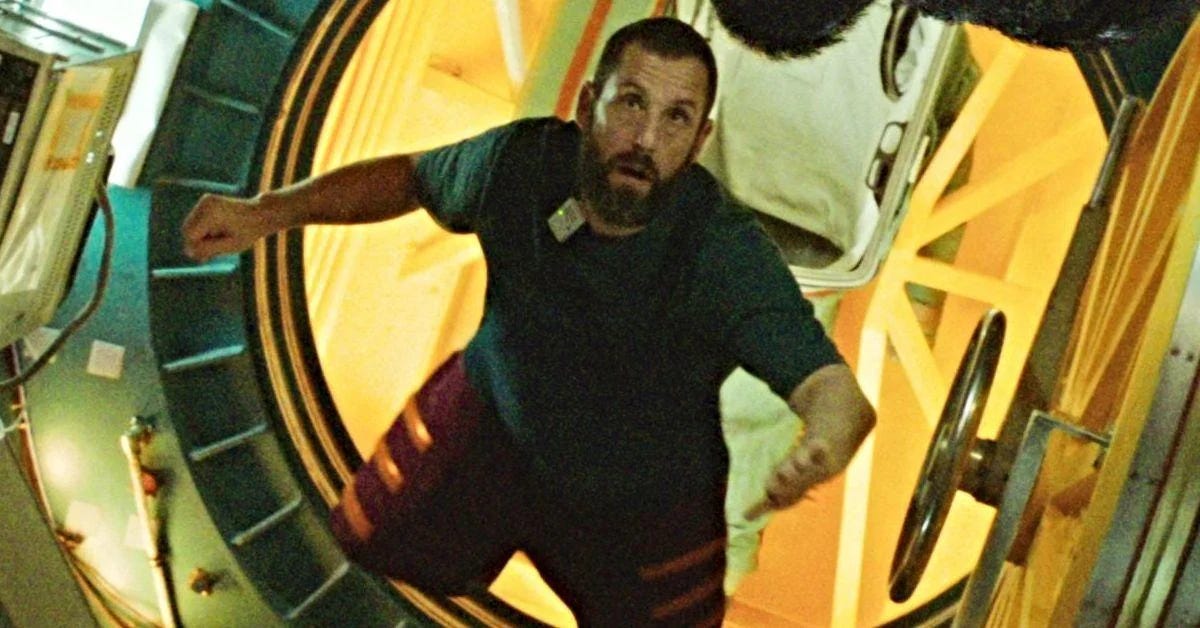
In Review: 'Dune: Part Two,' 'Spaceman'
Two new films make journeys to outer space to tell strikingly different sorts of stories.
Dune: Part Two
Dir. Denis Villeneuve
167 min.
Turning Frank Herbert’s Dune into a viable movie—or, in this case, two movies that could function as a five-hour-plus science-fiction epic—is an impossible proposition that director Denis Villeneuve, to his immense credit, has made plausible. And even Villeneuve hasn’t resolved the unique tonal duality of the novel, tied to a precious resource that’s both essential to space travel and for majorly tripping balls. To make Dune function as a Hollywood blockbuster, Villeneuve has severely limited the hallucinogenic kick of the book, but there’s nonetheless a great deal of audacity to telling this story, which takes the form of the classic hero’s journey, but measures the consequences of him coming into power. Paul Atreides is not Luke Skywalker. Defeating an evil galactic empire invites a fate darker than dancing Ewoks.
Cleaving a novel in two carries its own structural risks, but the first part of Dune ends on a pivotal moment, with Paul (Timothée Chalamet) and his Bene Gesserit mother Lady Jessica (Rebecca Ferguson) deposited deep in the seemingly unsurvivable desert of Arrakis. A dastardly plot by the Emperor Shaddam IV (Christopher Walken!) and the Harkonnens had succeeded in wiping out House Atreides, bringing control of the planet and its lucrative mining business back into Harknonnen hands. Yet Paul, following a prophecy that echoing louder and louder in his conscience, chooses not to leave Arrakis, aligning himself instead with the indigenous Fremen, led by Stilgar (Javier Bardem), who increasingly believes that he’s found the fabled messiah that will bring his people to paradise. He’s also drawn to Chani (Zendaya), a Fremen woman who’s more skeptical of his spiritual significance, but nonetheless likes the cut of his stillsuit.
Villeneuve takes his time establishing the rhythms and beauty of Fremen culture along with the religious divisions that play a role in how Paul is received in the short- and long-term, especially as the action shifts toward the fundamentalists to the south. In the meantime, Paul and Lady Jessica are brought into the underground network of Sietches where the Fremen sustain an austere yet egalitarian culture on a planet where water is a precious resource and the dunes patrolled by giant sandworms. As the Harkonnens seek to reestablish their mining operation, Paul joins the Fremen in effective guerrilla attacks on massive spice harvesters and Carryalls. Meanwhile, the impending death of the Fremen’s Reverend Mother gives Lady Jessica an opportunity to assume the role, but when she drinks the ritualistic poison called the Water of Life, it awakens the baby she’s still carrying inside her and suggests Paul’s sibling-to-be will be a force of her own.
Between the seat-rattling bwaaaaaaaamps of Hans Zimmer’s score and the sheer immensity of the spacecraft, sandworms, and warring armies, Dune: Part Two can feel a bit oppressive, like trying to withstand a Harkonnen blitz. It’s a crucial relief, then, that Villeneuve allows for some moments of calm and humor to lighten the tone however briefly, whether pausing to admire the golden landscape or giving Bardem the space to put a comic spin on Stilgar’s zealotry. There’s also a pulpy charge to Austin Butler’s performance as Feyd-Rautha, the psychotic young warrior who’s set up to lead the Harkonnen, provided he can slash through Paul first. Villeneuve delivers enough space adventure and romance to give Dune: Part Two the shape of a mainstream blockbuster, only to subvert it aggressively.
Herbert’s novel is partly an allegory for the Middle East and the never-ending conflict over oil, the Earth’s most exploitable spice, which presents the allegorically dodgy scenario of Paul, a white outsider, leading the native Fremen to a victory they could not achieve on their own. But Dune: Part Two does well to complicate the issue by exposing regional divisions within the Fremen over the prophecy and by questioning Paul’s ascendence, which could potentially ignite a Holy War. It would be simple and satisfying enough for Dune to celebrate Paul leading the Fremen to a righteous victory over the Harkonnen and the Emperor, but there are no clean outcomes here, no triumphs that don’t carry the possibility of another kind of defeat. At the end of this second part, it seems again a miracle that Dune got made—and made this well. — Scott Tobias
Dune: Part Two arrives in theaters today.
Spaceman
Dir. Johan Renck
107 min.
It’s one of the quirkiest aspects of Adam Sandler’s deeply quirky filmography that the plots of his more artistically ambitious films could, in bare description, be mistaken for those of his more straightforward comedies. A toilet plunger salesman who runs afoul of a phone sex scam, a jeweler who has to deal with a deeply superstitious NBA star, a cobbler who can magically assume the identities of his clients: with a few changes, these could easily by films by Dennis Dugan or Frank Coraci. See also, Sandler’s latest, Spaceman, in which he plays a lonely astronaut who befriends a soulful spider from outer space.
Except Spaceman is not a wacky comedy but a serious film. Deeply serious. Solemn even. Funereal, if you want to be unkind. Directed by Johan Renck (his second feature after 2008’s Downloading Nancy but with a lot of memorable videos and TV episodes in between), Spaceman adapts Jaroslav Kalfař’s 2017 novel Spaceman of Bohemia, the tale of a Czech astronaut sent to investigate a mysterious cloud called Charon in a remote region of the solar system. Sandler stars as Jakub who, as the film begins, is already in mid-meltdown. Wearing a sloppy beard and a hooded expression, it’s clear the pressure of being alone for so long has clearly gotten to him, a situation exacerbated by the fraying of his marriage to Lenka (Carey Mulligan), the pregnant wife he left behind. Then, preceded by the mysterious failure of his ship’s cameras, Jakub begins receiving visits from a giant spider (voiced by Paul Dano). Appropriately freaked out at first, he soon begins to converse with the being he names Hanuš after the inventor of Prague’s astronomical clock who was blinded so he could never repeat his work.
The story of the real-life Hanuš is more legend than fact and though the film raises the issue of whether Jakub’s Hanuš might also be more imaginary than real, it never seems particularly interested in resolving it. Instead, the film immediately locks onto Jakub’s downcast mood and lets this set the tone for every scene. From Sandler’s typically strong dramatic performance to Dano’s eerily soothing voice work (even as Hanuš asks difficult questions Jakub doesn’t want to answer) to Max Richter’s score to the dreamy space footage, Spaceman sustains a hazy, depressive tone. Unfortunately, this makes the film play like a single note stretched to a long drone. Colby Day’s screenplay occasionally touches on Jakub’s past and his family’s connections to some dark moments in Czech history, but it keeps the focus on Jakub and Lenka’s difficult history, and the question of whether or not he’ll have a home to return to when the mission ends.
The film’s flashbacks to their past—shot via a distorted lens—play a bit like Eternal Sunshine of the Spotless Mind. Much of the rest of Spaceman alternately calls to mind Solaris and 2001: A Space Odyssey (if Keir Dullea had an arachnid sidekick talking him through his encounter with infinity and beyond). Those comparisons aren’t always flattering and Spaceman ultimately doesn’t really work, but it’s too heartfelt and odd and made up of so many individually compelling elements (including the effects used to create Hanuš) to dismiss outright. Its repetitiveness, however, becomes a bit oppressive. It’s lonely out in space. We get it. —Keith Phipps
Spaceman premieres on Netflix tomorrow.




















Disappointing, I was hoping SPACEMAN was a 30 ROCK spin-off pronounced Spe-CHEM-an.
Me certainly not going to rush out to see leaden Adam Sandler space movie. But space nerd in me has to make this observation — why someone would name mysterious cloud at edge of solar system Charon, when Pluto's moon/co-dwarf-planet — also at edge of solar system — also named Charon? It like discovering mysterious island off of coast of Madagascar and naming it Madagascar.